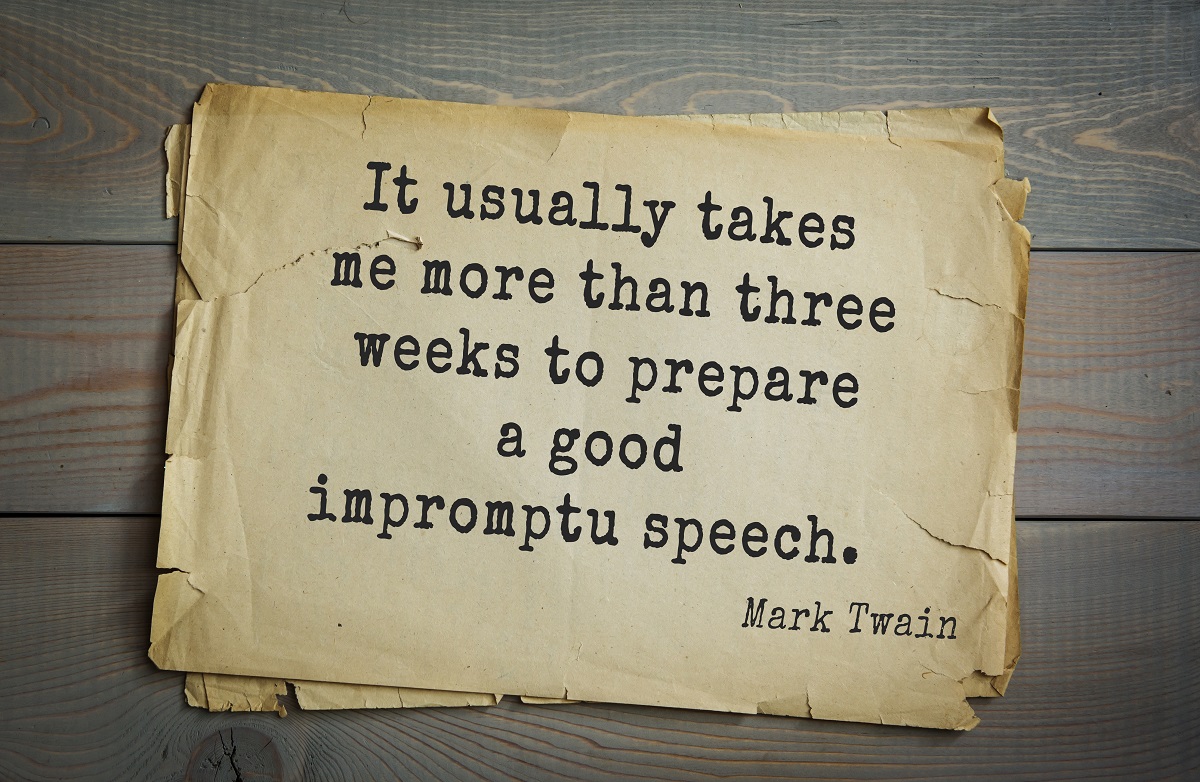An impromptu speech is given “off the cuff” or “on the spur of the moment.” The talk has little preparation, and the speaker usually has no advanced knowledge of the subject. Giving the speech requires quickly organizing a few comments to present to the audience.
While some people may find impromptu speaking to be nerve-wracking, others view giving an impromptu speech as an opportunity to showcase their speaking skills and demonstrate their ability to adapt to unexpected situations.
This article explores the art of impromptu speaking, including tips and strategies for delivering successful speeches and overcoming the fear of public speaking.
While Mark Twain kidded that it took him three weeks to prepare an impromptu speech, the reality is that impromptu speeches come from a lifetime of living and learning.
What Is An Impromptu Speech?
Impromptu speeches are a form of public speaking that require individuals to deliver a speech on a topic with little or no preparation beforehand. These speeches can be challenging, as speakers must rely on their knowledge, creativity, and ability to think on their feet to deliver a compelling message.
Impromptu speeches can occur in various settings, including classrooms, business meetings, and social events, and they can cover a range of topics, from current events to personal experiences. Knowing how to give this type of speech is useful as most people have frequent opportunities to use the skill in daily life.
If you think talking on the spur of the moment is easy, just watch man-on-the-street interviews on a show like Jimmy Kimmel Live.
You will realize that many people cannot think on their feet and access information they probably know, much less organize it coherently. Politicians and busy people tend to do better.

What Is The Main Difference Between A Speech And An Impromptu Speech?
The main difference between a speech and an impromptu speech is the level of preparation involved. A speech is a planned and rehearsed presentation designed to deliver a specific message or argument to an audience. Speakers can research their topic, organize their thoughts, and practice their delivery before giving a speech.
In contrast, an impromptu speech is given with little or no preparation and requires speakers to rely on what they know, then quickly package the information on the spot. Impromptu speeches are often given in response to unexpected situations, such as a question or comment from the audience. They require speakers to articulate their thoughts clearly and concisely in real-time.
What Is The Main Goal Of An Impromptu Speech?
The main goal of an impromptu speech is to effectively communicate a message or idea to an audience without time for preparation.
What they say should be clear, concise, and impactful – and on message and in line with their position in prepared speeches. Politicians such as Joe Biden are often criticized for their unscripted remarks.
The goal of an impromptu speech may vary depending on the context in which it is given, but generally, it aims to provide insight, perspective, or a solution to a problem. Speakers may also seek to engage and persuade their audience to take action or change their views on a particular topic.

What Are The Three Parts Of An Impromptu Speech?
The three parts of an impromptu speech are the introduction, body, and conclusion.
- The introduction of an impromptu speech should grab the audience’s attention and provide a clear and concise overview of the topic. This may include a brief statement about the speech’s purpose, an attention-grabbing question, or an anecdote to set the tone.
- The body of an impromptu speech should contain the main points and supporting details of the speaker’s message. You should stay on topic and organize the content logically and coherently. Speakers can use examples, stories, or personal experiences to illustrate their points and make them more memorable.
- The conclusion of an impromptu speech should summarize the key points and provide a memorable closing statement. Speakers can end with a call to action, a thought-provoking question, or a special quote to leave a lasting impression on the audience.
How Can I Start My Impromptu Speech?
Starting an impromptu speech can be challenging, but here are a few tips to help you get started:
- Before speaking, take a deep breath to calm your nerves, compose yourself and clear your mind. This will help you focus and present yourself confidently.
- You can also start your speech by asking a question related to the topic. Engaging the audience and getting them thinking about the subject matter is a useful ploy. Be sure the question is relevant and thought-provoking.
- Also, thank the audience for the opportunity to speak or for their attention. These thanks help you connect with them and create a positive tone for your speech.
- Quickly introduce the topic of your speech and provide some context to help the audience understand what you will be talking about. You can use a quote, statistic, or personal experience to grab their attention and make the topic more relatable.
- State the main point or message you want to convey in your speech. This will help you stay focused and give your audience a clear idea of what they can expect to hear.
How Long Should An Impromptu Speech Be?
The length of an impromptu speech can vary depending on the situation and context in which it is given. In general, an impromptu speech should be concise and to the point, lasting anywhere from one to five minutes.
If the speech is presented in a classroom or educational setting, it may be shorter, typically lasting one to two minutes. This allows the speaker to communicate their message effectively and succinctly while keeping the audience engaged.
An impromptu speech may be slightly longer in a business or professional setting, lasting two to five minutes. Speakers can use this extra time to provide more context and detail while being concise and engaging.
What Are Examples Of Impromptu Speech?
Impromptu speeches can happen in many different situations and contexts, such as:
- Giving a speech or presentation on a topic you are unfamiliar with but must speak about at the last minute.
- Answering a question during a Q&A session or a discussion panel without prior notice or preparation.
- Speaking at a social event or gathering, such as a wedding, where you may be asked to say a few words on the spot.
- Providing feedback or commentary during a meeting or brainstorming session where you are asked to contribute your thoughts and ideas.
- Responding to a crisis or emergency situation where you may need to speak to a group of people quickly and effectively to provide information and direction.

Further Aspects Of Impromptu Speech
Starting Early
Students develop impromptu speaking skills in high school through practice and preparation. They often have to give impromptu speeches on various topics, which are challenging as they typically require quick thinking and effective communication skills.
Preparation And Speech Tips
When preparing for an impromptu speech, focusing on the speech structure and using frameworks to organize your thoughts is important. A good impromptu speech should not ramble and have an introduction, body, and conclusion with clear and concise points.
During the speech, eye contact and body language are important factors. Maintaining eye contact with the audience can help build a connection and make the speech more engaging, while using appropriate body language can help reinforce the message.
Topics For Speech
One way to prepare is to practice giving sample speeches on different topics, such as current events, personal experiences, or hypothetical situations. You can use your best friend as your audience to start with.
Remember, the effectiveness of an impromptu speech is in the eye of the beholder. What may seem like a good impromptu speech to one person may not be as effective for another. However, with proper preparation time and practice, students can develop their improvisational speaking skills and deliver a great one-minute speech on any topic.
S.T.A.R.
Effective impromptu speaking should have a speech outline and use transitions to move smoothly between different points. One useful acronym for this is “S.T.A.R.,” which stands for Situation, Task, Action, and Result.
Speeches might be persuasive speeches or informative ones. A customer may ask a sales rep for information on a product in the line, and the salesperson may tell the customer about it and encourage him to buy. A skillful speaker can tweak the impromptu speech as needed by focusing on the S.T.A.R. points,

Toastmasters clubs often provide opportunities for impromptu speaking, such as through Table Topics, where members are asked to speak for one to two minutes on a random topic.
Public speaking courses and workshops also help individuals develop their impromptu speaking skills. These courses provide a safe environment for individuals to practice their skills, receive feedback from evaluators, and learn how to deliver a short speech without rambling or losing focus. In a job interview setting, impromptu speaking skills can be particularly valuable.
You can deliver an effective speech on any topic, no matter how random or unexpected. With a piece of paper and some basic skills, anyone can improve their impromptu speaking abilities and become a confident and effective communicator.

